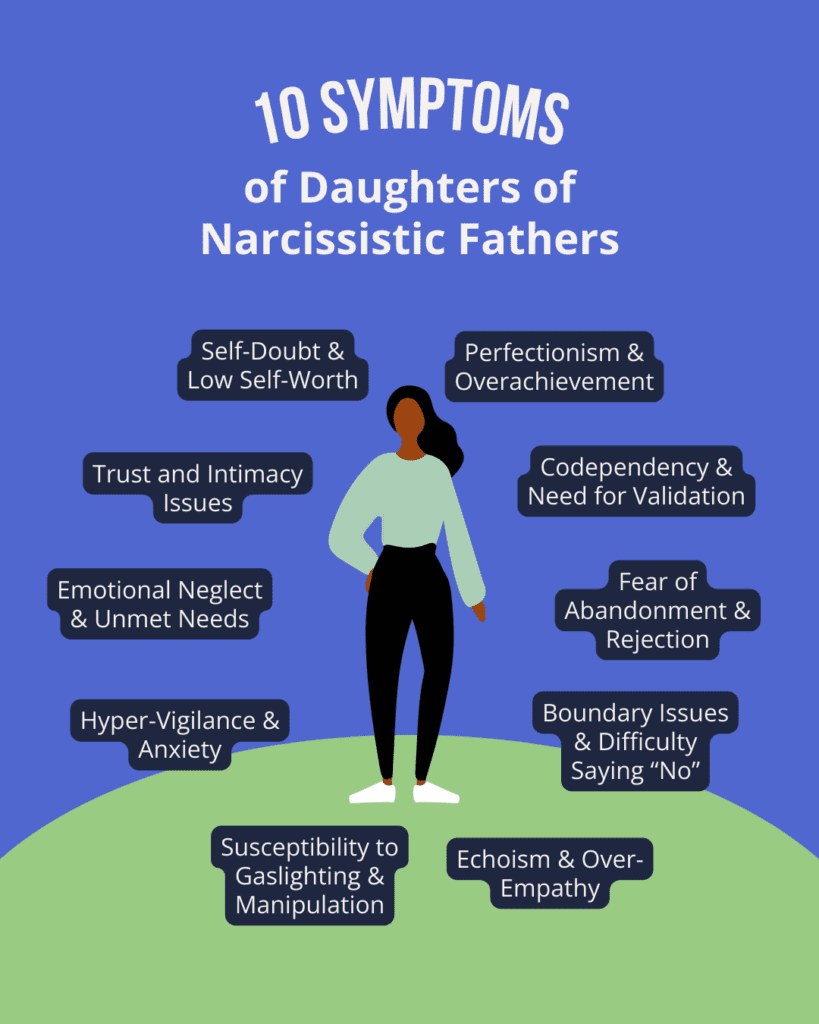10 Symptoms of Daughters of Narcissistic Fathers & How to Heal
10 Symptoms of Daughters of Narcissistic Fathers & How to Heal
📅 Updated: February 4, 2025
This article was originally published in July 2024 and has been updated to include new insights and additional sections.
If you grew up feeling like nothing you did was ever good enough, constantly doubting yourself, or struggling with trust in relationships—you may be the daughter of a narcissistic father. The effects of narcissistic parenting run deep, shaping self-worth, emotional resilience, and adult relationships.
This guide explores 10 common symptoms experienced by daughters of narcissistic fathers and provides insights into their traits, emotional impact, and ways to heal. Understanding these patterns is the first step toward reclaiming your identity and emotional well-being.
Jump to Section:
- Narcissistic Father Traits
- Symptoms of Daughters of Narcissistic Fathers
- How to Deal with a Narcissistic Father
- Healing and Moving Forward: Strategies for Recovery

What is a Narcissist? Understanding Narcissism
What is a narcissist? Narcissistic Personality Disorder (NPD) is a mental health condition characterized by a pervasive pattern of grandiosity, a deep need for admiration, low self esteem, and a lack of empathy. NPD can manifest in multiple ways, including in overt and covert versions. Recognizing its traits is especially important when parenting or in positions of power over others.
Individuals with NPD often create a façade of superiority and self-importance to mask their deep-seated insecurities and fears. When a family has a father with NPD, his narcissistic traits can significantly impact his children. Moreover, the father-daughter relationship can be a crucial one, shaping a child’s self-esteem, self-worth, and her future relationships. A narcissistic father, with his emotional neglect and manipulation, can leave his daughter grappling with a host of psychological challenges.
Narcissistic Father Traits: Recognizing the Signs
If you’ve ever asked, “Is my dad a narcissist?” recognizing these narcissistic father traits can help you understand the patterns that shaped your experiences. A narcissistic father’s behavior often revolves around control, validation, and emotional dominance, leaving lasting effects on his children.
- Grandiosity & Superiority Complex – Sees himself as more important or exceptional, often exaggerating achievements and demanding admiration.
- Lack of Empathy – Struggles to acknowledge or validate your feelings, making you feel unheard or unimportant.
- Control & Manipulation – Uses guilt, fear, or passive-aggressive tactics to dominate decisions and maintain authority.
- Emotional Neglect – Dismisses your emotional needs, leaving you craving validation and struggling with self-worth.
- Gaslighting & Psychological Abuse – Distorts reality, making you question your own memories, feelings, or perceptions.
- Conditional Love & Approval – Love and affection are earned based on obedience, achievements, or meeting his expectations.
Recognizing these signs of a narcissistic father is a powerful first step in understanding the impact on your emotional well-being and starting your healing journey.
Symptoms of Daughters of Narcissistic Fathers

1. Chronic Self-Doubt and Diminished Self-Worth
One of the most common symptoms in daughters of narcissistic fathers is chronic self-doubt. This stems from the narcissistic father’s constant criticism and impossible standards. The daughter may internalize the belief that she is never good enough, leading to a diminished sense of self-worth.
This self-doubt can permeate all areas of her life, from her personal relationships to her professional endeavors. She may constantly second-guess her decisions, fearing that she will make a mistake or disappoint others. This can lead to a debilitating fear of failure and a tendency to self-sabotage.
The daughter’s self-esteem is further eroded by the narcissistic father’s lack of empathy and validation. She may feel unseen and unheard, her feelings and experiences invalidated. This can lead to a deep sense of unworthiness and a belief that she is undeserving of love, respect, and success.
2. Perfectionism and Overachievement
Perfectionism is another common symptom in daughters of narcissistic fathers. This is often a response to the father’s high expectations and harsh criticism. The daughter may feel that she must be perfect in order to earn her father’s approval and avoid his disapproval.
This drive for perfection can lead to overachievement. The child may push herself to excel in all areas of her life, from academics to extracurricular activities. She may take on too many responsibilities and put immense pressure on herself to succeed. This can drastically affect one’s mental health.
Moreover, this relentless pursuit of perfection and success often comes at a high cost. It can lead to chronic stress, burnout, and a lack of balance in the daughter’s life. It can also prevent her from taking risks and pursuing her true passions, as she fears failure and criticism.
3. Difficulty with Trust and Intimacy in Relationships
Daughters of fathers with narcissistic traits often struggle with trust and intimacy in their relationships. This is largely due to the inconsistent and unpredictable behavior of the narcissistic behavior of their father. The daughter may have learned to be on guard and to expect betrayal or abandonment.
This fear of vulnerability can make it difficult for the daughter to form deep, meaningful connections with others. She may keep people at a distance to protect herself from potential hurt. This can lead to feelings of loneliness and isolation, even when she is surrounded by people.
It’s important to note that these trust issues are not insurmountable. With time, therapy, and conscious effort, daughters of narcissistic fathers can learn to build healthy, trusting relationships. They can learn to let down their guard and allow themselves to be vulnerable, without fear of rejection or betrayal.
4. Codependency and the Need for External Validation
Daughters of narcissistic fathers often develop a pattern of codependency in their relationships. This is a learned behavior, a survival mechanism from their childhood. They may feel responsible for the emotional well-being of others, often at the expense of their own needs and feelings.
This codependency often goes hand in hand with a deep-seated need for external validation. Daughters of these fathers may constantly seek approval and affirmation from others. This is because their self-worth was often tied to their ability to please their narcissistic father.
However, it’s crucial to understand that this need for external validation and tendency towards codependency can be unlearned. With therapy and increased self-awareness, daughters of narcissistic fathers can learn to validate themselves and establish healthier, more balanced relationships. The anxious and pleasing tendencies can be adapted and adjusted for stronger and less fear-based relationships.
5. Emotional Neglect and Unmet Emotional Needs
Emotional neglect is a common experience for daughters of narcissistic fathers. They are often incapable of providing the emotional support and nurturing that a child needs. This can leave daughters feeling unseen, unheard, and unimportant.
These unmet emotional needs can carry over into adulthood, leading to:
- Chronic feelings of emptiness or emotional numbness
- Difficulty identifying and expressing emotions
- Fear of triggering conflict by speaking up
Recognizing and addressing this emotional neglect is a crucial step in the healing process. Therapy can provide a safe space for these kids to explore their emotions, learn to validate their feelings, and begin to fulfill their own emotional needs. As they grow into adulthood, they can learn to live boldly and autonomously versus in the shadow of their narcissistic parent.
6. Fear of Abandonment and Rejection
Daughters of narcissistic fathers often develop a deep-seated fear of abandonment and rejection. This fear stems from the inconsistent and conditional love they received from their narcissistic parent. They may have been praised one moment and harshly criticized the next, creating an unstable emotional environment.
This fear can manifest in adulthood as a constant need for reassurance in relationships, a tendency to cling to unhealthy relationships, or an avoidance of relationships altogether. It can also lead to self-sabotaging behaviors, as these individuals may unconsciously push people away to avoid the pain of potential rejection.
Overcoming this fear involves building self-esteem, learning to trust others, and developing healthy attachment styles. Trusted relationships, both professional and personal, can take someone affected by narcissism a long way in finding healing.

7. Hyper-Vigilance and Anxiety
Living with a father with narcissism often leads to a state of hyper-vigilance in daughters. This is a heightened state of sensory sensitivity accompanied by an exaggerated response to detected threats. Daughters may have learned to constantly monitor their father’s mood and behavior to avoid conflict or criticism.
This hyper-vigilance can carry into adulthood, manifesting as anxiety disorders. These individuals may find themselves constantly on edge, anticipating danger even in safe environments. They may struggle with panic attacks, social anxiety, or generalized anxiety disorder.
Addressing this symptom often involves cognitive-behavioral therapy or other forms of therapy that help to reframe thought patterns. Mindfulness and relaxation techniques can also be beneficial in managing anxiety and reducing hyper-vigilance. It’s important for these kids to understand that their hyper-vigilance was a survival mechanism; with time and support, they can learn healthier ways to navigate their world.
8. Boundary Issues and Difficulty Saying “No”
Narcissistic fathers often disregard the personal boundaries of their daughters. This can lead to a pattern where daughters struggle to assert their own boundaries in adulthood. They may find it difficult to say no, even when they are uncomfortable or overwhelmed.
This inability to set boundaries often stems from a fear of rejection or retaliation. Kids of narcissistic parents may have learned that asserting their needs or desires leads to conflict or punishment. As a result, they may prioritize the needs of others over their own; this leads to burnout and resentment.
It’s crucial to understand that setting boundaries is not selfish, but a necessary aspect of self-care. With practice and support, these daughters can learn to express their needs and limits in a healthy, assertive manner.
9. Susceptibility to Gaslighting and Psychological Manipulation
Gaslighting is a common tactic used by narcissistic fathers. This involves manipulating someone into questioning their own sanity and perception of an experience. Daughters of narcissistic fathers may find themselves doubting their own perceptions and memories due to this form of psychological manipulation.
This susceptibility to gaslighting can lead to a distorted sense of reality. These children may struggle to trust their own judgment, leading to confusion and self-doubt. This can have a profound impact on their mental health and their ability to form healthy relationships.
Overcoming the effects of gaslighting can be challenging, but it is possible. It’s important for these individuals to learn to trust their own experiences and perceptions, and to understand that their feelings are valid.
10. Echoism: Coping Response to Narcissism
Echoism is a term used to describe individuals who tend to mirror and amplify the emotions and behaviors of others, particularly narcissists. Daughters of narcissistic fathers may develop echoistic tendencies as a survival mechanism; often they become overly empathetic and self-effacing to avoid conflict.
These daughters may struggle to assert their own needs and desires, instead prioritizing the needs of others. This can lead to a lack of self-identity and a tendency to seek validation externally. Echoists often struggle with self-esteem issues and may find it difficult to set and enforce personal boundaries. Understanding and addressing echoism is a crucial part of the healing process for daughters of narcissistic fathers.

How to Deal with a Narcissistic Father
Navigating a relationship with a narcissistic father can be emotionally exhausting, but you have the power to protect your well-being and reclaim your sense of self. Healing doesn’t mean fixing him—it means learning how to care for yourself in the face of his behaviors. Here are some strategies to help you manage this challenging dynamic with strength and clarity:
- Setting & Enforcing Boundaries – Clearly define what behaviors you will and won’t tolerate. Be firm, consistent, and prepared for pushback, knowing that boundaries are an act of self-care.
- Detaching from Emotional Manipulation – Recognize when guilt, criticism, or control tactics are being used against you. Remind yourself that his words and actions are a reflection of him, not your worth.
- Avoiding Gaslighting Traps – Stay grounded in your truth. Keep a journal of events, confide in trusted loved ones, and remind yourself that your emotions and experiences are valid.
- Seeking Therapy & Support Networks – You don’t have to navigate this alone. Therapy can help you process complex emotions, and support groups or trusted friends can offer understanding and encouragement.
- Deciding Whether to Go No-Contact – If the relationship is too damaging, it’s okay to step away—temporarily or permanently. Choosing distance is not about punishment but about protecting your peace.
Healing and Moving Forward: Strategies for Recovery
Healing from the effects of a narcissistic father is a journey that requires patience, self-compassion, and professional support. Therapies such as cognitive-behavioral therapy (CBT) and trauma-focused therapy such as can be instrumental in helping individuals affected by narcissistic fathers process their experiences and develop a stronger sense of self.
Support groups, both online and offline, can also provide a safe space for sharing experiences and learning from others who have faced similar challenges. Reading literature on narcissism, attending workshops, and listening to survivor stories can also provide comfort and a sense of community. It’s important to remember that recovery is not a linear process and will have difficult days. However, with time, resilience, and the right support, it is possible to rebuild one’s life and identity beyond the shadow of a narcissistic father.
Healing from a Narcissistic Father: Steps to Recovery
Recovering from the effects of a narcissistic father is a journey that requires patience, self-compassion, and the right support system. Healing doesn’t happen overnight, but by taking intentional steps, you can rebuild self-worth, set boundaries, and move forward with confidence.
1. Seek Professional Support
- Therapy for Narcissistic Abuse Recovery – Cognitive-Behavioral Therapy (CBT) helps reframe negative thought patterns, while Eye Movement Desensitization and Reprocessing (EMDR) is effective for processing trauma.
- Consider working with a therapist specializing in narcissistic abuse to navigate deep-seated wounds. If you live in Colorado or Illinois, we have therapists who would love to walk along side you.
2. Set Boundaries & Detach Emotionally
- Learning to set firm boundaries is key to protecting your mental health.
- Practice gray rock techniques (remaining emotionally unresponsive) when dealing with a manipulative parent.
3. Join Support Groups & Find Community
- Connecting with others who have experienced narcissistic parenting can provide validation and emotional support.
- Consider online forums, therapy groups, or survivor networks dedicated to healing from narcissistic abuse.
4. Educate Yourself on Narcissistic Behavior
- Reading books or literature, listening to survivor podcasts, and attending workshops on narcissistic abuse recovery can help you understand your experiences and regain control.
5. Rebuild Self-Worth & Confidence
- Healing involves redefining your identity outside of your father’s influence.
- Engage in self-care practices, challenge self-doubt, and affirm your worth through positive self-talk.
Conclusion: You Deserve Healing & Freedom
Healing from the impact of a narcissistic father is not easy, and the journey is rarely linear—but it is possible. With time, resilience, and the right support, you can break free from emotional wounds, rebuild your self-worth, and cultivate healthy, fulfilling relationships. You are not defined by the pain of the past, but by the strength and courage it takes to heal and move forward.
You don’t have to navigate this journey alone. If you’re in Illinois or Colorado, our team of compassionate therapists is here to support you. Whether you’re looking to process childhood trauma, build confidence, or learn to set healthy boundaries, we can help. Give us a call or fill out our intake form today—because you deserve peace, healing, and a future free from the shadows of the past.
Related Articles
-
Merging American Sign Language and Mental Health
ASL therapy is when a client is working with a therapist who understands the Deaf culture...
Read More -
The Power of Movement for Your Wellbeing
When we hear the term, “mental health,” perhaps what comes to mind first are words like...
Read More -
Your Kids & Social Media: When Parental Controls Aren’t Enough
If you’re in the age range of late twenties to late thirties, you probably remember growing...
Read More